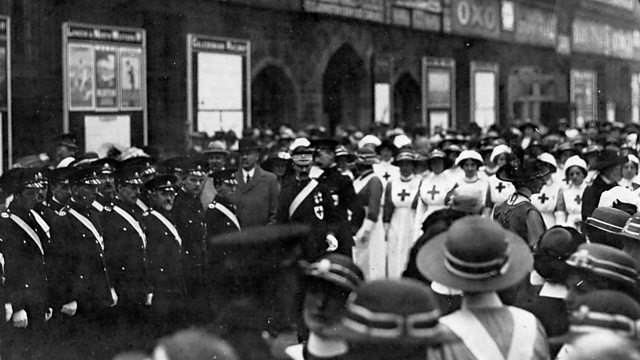Citadel Station, Carlisle: Hospital City
Providing a vital lifeline for sick and wounded soldiers
Excellent rail connections to and from Carlisle, and its proximity to Scotland, made the station a vital staging post for the treatment and movement of injured soldiers.
The Citadel Station was to witness first-hand the suffering of hundreds of thousands of wounded men, as they were greeted on the platforms by local volunteers who gave them food and drink. In the early stages of the war most of the injured soldiers greeted on the platforms at the Citadel Station were moved up to Scottish hospitals for treatment. But with ever increasing numbers of wounded troops coming back from the trenches of the Western Front, Carlisle became a destination in its own right and not just a break in the journey.
Demand was so great that new hospitals had to be created from scratch to provide the necessary extra bed space. There were three main hospitals created to treat the wounded in Carlisle during World War One (WW1); Fusehill – which was a workhouse and converted by the military in 1916 into a 400 bed facility, and its auxiliary units included Brook Street and Newtown. Both were schools, but pressure for beds was so intense that the pupils were moved out and the nurses moved in.
The trains, with their ghostly cargo, would often draw into the platforms at night and local volunteers would be there to greet them. In time the city purchased some ambulances to aid the transfer of wounded across the city, but in the early days enthusiastic car owners picked the injured up from the station.
Built in 1847 in a neo-Tudor style and designed by William Tite; Citadel Station is a major stop on the West Coast Main Line, it was used by seven railway companies in the run-up to WW1 and it was 299 miles north of London Euston and 102 miles south of Glasgow.
Location: Citadel Station, Carlisle CA1 1QZ
Image: Citadel Station Medical Corps, courtesy of Ashley Kendal
Duration:
This clip is from
Featured in...
![]()
�鶹�� Radio Cumbria—World War One At Home
Places in Cumbria that tell a story of World War One
More clips from World War One At Home
-
![]()
The loss of HMY Iolaire
Duration: 18:52
-
![]()
Scotland, Slamannan and the Argylls
Duration: 07:55
-
![]()
Scotland Museum of Edinburgh mourning dress
Duration: 06:17
-
![]()
Scotland Montrose 'GI Brides'
Duration: 06:41







